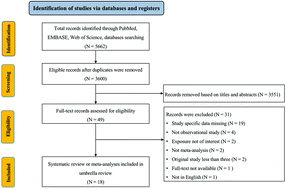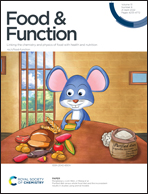Cruciferous vegetable consumption and multiple health outcomes: an umbrella review of 41 systematic reviews and meta-analyses of 303 observational studies†
Abstract
Background: Epidemiological studies evaluating the associations between the consumption of cruciferous vegetables (CV) and diverse health outcomes have generated inconsistent findings. Therefore, we carried out an umbrella review to systematically summarize existing evidence on this topic. Methods: This study had been registered at PROSPERO (no. CRD42021262011). Relevant systematic reviews and meta-analyses of observational studies were identified by searching PubMed, Web of science, and Embase databases from inception up to March 15, 2021. Observational studies investigating the association between CV intake and multiple health outcomes in humans were eligible for inclusion. The validated AMSTAR (A Measurement Tool to Assess Systematic Reviews) instrument was utilized for assessing the methodological quality of the included systematic reviews. For each meta-analysis, we assessed the summary effect size by using fixed and random effects models, 95% prediction intervals, heterogeneity, evidence of small-study effects, and excess significance bias. Results: Our umbrella review included 41 meta-analyses of 303 individual studies involving 13 394 722 participants. Twenty-four health outcomes including cancers (n = 23), cardiovascular disease (n = 12), mortality (n = 5), and metabolic diseases (n = 1) were evaluated. The summary random effects estimates were significant at P < 0.05 in 24 meta-analyses – all of which reported decreased risks of health outcomes. All were of moderate methodological quality in our study. Of the 41 meta-analyses, we observed suggestive evidence for beneficial associations between gastric cancer, lung cancer, endometrial cancer, and all-cause mortality. Moreover, 16 associations were supported by weak evidence, including breast cancer, lung cancer, renal cell carcinoma, bladder cancer, prostate cancer, ovarian cancer, endometrial cancer, colon cancer, colorectal adenoma, colorectal neoplasm, non-Hodgkin lymphoma, and total cancer. Conclusions: It revealed that CV intake might be associated with beneficial effects on several health-related outcomes (gastric cancer, lung cancer, endometrial cancer, and all-cause mortality). Other associations could be genuine, but substantial uncertainty remains. Additional studies are needed to evaluate the relationship between the consumption of CV and various health outcomes as well as robust randomized controlled trials in the future.



 Please wait while we load your content...
Please wait while we load your content...